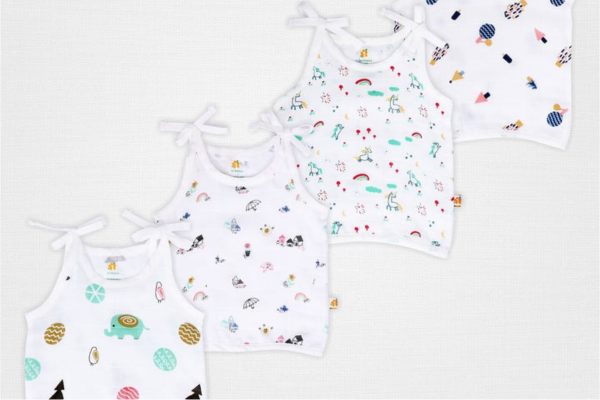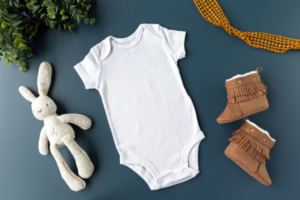When it comes to choosing baby clothes, parents are often drawn to adorable prints, cute patterns, and stylish outfits. However, one of the most important factors to consider, especially for babies with sensitive skin, is the fabric. Baby skin is much more delicate and sensitive than adult skin, making it more prone to irritation, rashes, and discomfort. Choosing the right material can make a significant difference in your baby’s comfort and health.
In this blog, we’ll explore how to choose the best baby clothes for sensitive skin, and why muslin cotton, in particular, is an excellent choice for your little one.
Understanding Baby’s Sensitive Skin
Babies have incredibly delicate and sensitive skin due to several factors:
- Thinness: A baby’s skin is much thinner than adult skin, which means it is more permeable and vulnerable to external factors like heat, cold, friction, and chemicals found in certain fabrics.
- Immature immune system: Since babies’ immune systems are still developing, their skin is more prone to allergic reactions, irritation, and infections.
- Lack of protective oils: Newborns, in particular, don’t produce as much protective oil (sebum) on their skin, which increases the likelihood of dryness and sensitivity.
For these reasons, it’s critical to select clothes that are gentle, breathable, and free from chemicals or harsh dyes.
Choosing the Best Fabrics for Babies with Sensitive Skin
When selecting clothes for babies, especially those with sensitive skin or conditions like eczema, certain fabrics are better suited than others. Here are some key factors to consider when choosing baby clothes:
1. Breathability
Babies tend to overheat more easily than adults, and fabrics that trap heat and moisture can lead to rashes and discomfort. It’s essential to choose breathable fabrics that allow air to circulate, helping regulate your baby’s body temperature.
2. Softness
Since babies’ skin is more delicate, soft fabrics are a must to prevent irritation and discomfort. Rough materials can cause chafing and rashes, especially in areas where the skin is most sensitive, such as around the neck, armpits, and diaper region.
3. Hypoallergenic Properties
Fabrics that are hypoallergenic reduce the risk of allergic reactions. Some fabrics are treated with chemicals, dyes, or other substances that can trigger allergies or skin reactions, especially in babies with sensitive skin.
4. Absorbency
Babies are prone to drooling, sweating, and diaper leaks, so fabrics with good moisture-absorbing qualities are helpful. Fabrics that wick away moisture and dry quickly help keep your baby comfortable throughout the day.
5. Ease of Care
For parents, practical considerations like ease of washing and durability are also important. Fabrics that can be washed frequently without losing their softness or shape are ideal for baby clothing.
Why Muslin Cotton is the Ideal Fabric for Sensitive Skin
One fabric that checks all the boxes when it comes to baby clothing for sensitive skin is muslin cotton. Muslin has been used for centuries as a lightweight, breathable fabric, and it has gained popularity in recent years as a go-to material for baby clothes, swaddles, and blankets.
Here are several reasons why muslin cotton is ideal for babies, especially those with sensitive skin:
1. Extremely Soft and Gentle
Muslin cotton is known for its soft, light texture. Unlike heavier cotton fabrics, muslin has a loose weave, making it softer and more comfortable against a baby’s skin. This softness is especially important for sensitive skin, as rough materials can lead to chafing and rashes.
Tip: Look for organic muslin cotton if possible, as it is free from harsh chemicals and dyes that could irritate sensitive skin.
2. Highly Breathable
One of the key features of muslin cotton is its breathability. The fabric’s loose weave allows air to flow freely, helping to regulate your baby’s body temperature. This prevents overheating and ensures that your baby stays cool and comfortable, even in warmer weather.
Breathability is especially important for babies who are prone to heat rashes or eczema, as fabrics that trap heat can exacerbate these conditions.
3. Naturally Hypoallergenic
Muslin cotton is naturally hypoallergenic, meaning it is unlikely to cause allergic reactions or skin irritations. Unlike synthetic fabrics that are often treated with chemicals, muslin is typically free from harmful additives that can trigger allergic reactions.
For babies with highly sensitive skin or allergies, hypoallergenic fabrics like muslin are a safer and more comfortable option.
4. Absorbent and Quick Drying
Babies often experience excess moisture from drooling, spit-up, or sweating. Muslin cotton is highly absorbent and quickly wicks away moisture, keeping your baby dry and comfortable. Additionally, muslin dries faster than many other fabrics, which means your baby won’t remain damp for long periods.
This moisture-wicking property is especially beneficial for babies with sensitive skin, as dampness can cause rashes and discomfort.
5. Durable and Long-Lasting
While muslin is a lightweight and soft fabric, it is also remarkably durable. This makes it ideal for baby clothes, which need to withstand frequent washing and wear. Unlike some fabrics that lose their softness or shape after multiple washes, muslin actually gets softer with each wash, maintaining its gentle feel over time.
6. Versatility
Muslin cotton is not only perfect for baby clothes but also ideal for other baby essentials like swaddles, burp cloths, and blankets. This versatility means you can outfit your baby in muslin from head to toe, ensuring their sensitive skin is always protected.
Muslin is available in various thicknesses, so you can choose lightweight muslin for warmer weather and thicker muslin layers for colder climates.
Tips for Choosing the Best Muslin Baby Clothes
When shopping for baby clothes made from muslin cotton, here are a few tips to help you make the best choice for your baby’s sensitive skin:
1. Look for Organic Muslin Cotton
While regular muslin cotton is already a great choice for sensitive skin, opting for organic muslin ensures that the fabric is free from harmful chemicals, pesticides, and dyes. Organic muslin is grown without the use of synthetic fertilizers or chemicals, making it the safest option for your baby’s skin.
2. Choose the Right Fit
It’s essential to ensure that the clothes you buy for your baby are neither too tight nor too loose. Tight clothing can cause irritation, while loose clothing can bunch up and cause discomfort. Muslin cotton clothes typically have a relaxed fit, but always double-check the sizing to ensure the best fit for your baby.
3. Wash Before Use
Even when buying clothes made from gentle fabrics like muslin cotton, it’s a good idea to wash all baby clothes before your baby wears them. This removes any residue from the manufacturing process and ensures the fabric is soft and clean. Use a mild, fragrance-free detergent to avoid further skin irritation.
4. Opt for Layering
Muslin cotton is a great material for layering, as it is lightweight and breathable. You can dress your baby in layers of muslin clothing to keep them comfortable in different temperatures. For example, a muslin onesie paired with a muslin blanket or swaddle will keep your baby cozy without overheating.
Other Fabric Options for Sensitive Skin
While muslin cotton is an excellent choice for baby clothes, there are other fabrics that also work well for babies with sensitive skin:
- Organic Cotton: Organic cotton is another fantastic option as it’s free from pesticides and chemicals. It’s soft, breathable, and hypoallergenic.
- Bamboo: Bamboo fabric is soft, eco-friendly, and has natural moisture-wicking properties. It’s also hypoallergenic and breathable, making it suitable for sensitive skin.
- Merino Wool: For colder weather, merino wool is a great option. It’s soft, temperature-regulating, and naturally hypoallergenic. Unlike traditional wool, merino wool doesn’t itch or irritate the skin.
Conclusion
When it comes to choosing the best baby clothes for sensitive skin, muslin cotton is an ideal choice. Its soft, breathable, and hypoallergenic properties make it perfect for babies with delicate skin. By opting for muslin cotton clothing, you can ensure your baby stays comfortable, safe, and irritation-free while looking adorable. Remember to prioritize softness, breathability, and ease of care when selecting your baby’s wardrobe to keep their sensitive skin healthy and happy.









